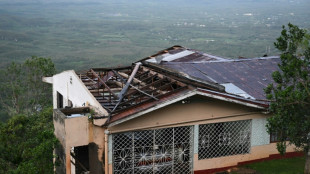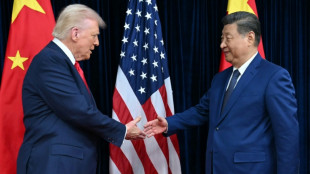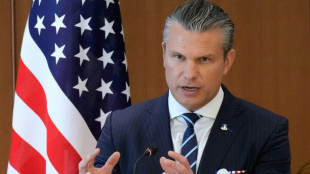
-
 'Nowhere to sleep': Melissa upends life for Jamaicans
'Nowhere to sleep': Melissa upends life for Jamaicans
-
Irish octogenarian enjoys new lease on life making harps

-
 Tanzania blackout after election chaos, deaths feared
Tanzania blackout after election chaos, deaths feared
-
G7 meets on countering China's critical mineral dominance

-
 Trump hails tariff, rare earth deal with Xi
Trump hails tariff, rare earth deal with Xi
-
Court rules against K-pop group NewJeans in label dispute

-
 India's Iyer says 'getting better by the day' after lacerated spleen
India's Iyer says 'getting better by the day' after lacerated spleen
-
Yesavage fairytale carries Blue Jays to World Series brink

-
 Bank of Japan keeps interest rates unchanged
Bank of Japan keeps interest rates unchanged
-
Impoverished Filipinos forge a life among the tombstones

-
 Jokic posts fourth straight triple-double as Nuggets rout Pelicans
Jokic posts fourth straight triple-double as Nuggets rout Pelicans
-
UN calls for end to Sudan siege after mass hospital killings

-
 Teenage Australian cricketer dies after being hit by ball
Teenage Australian cricketer dies after being hit by ball
-
As Russia advances on Kupiansk, Ukrainians fear second occupation

-
 Trade truce in balance as Trump meets 'tough negotiator' Xi
Trade truce in balance as Trump meets 'tough negotiator' Xi
-
China to send youngest astronaut, mice on space mission this week

-
 Yesavage gem carries Blue Jays to brink of World Series as Dodgers downed
Yesavage gem carries Blue Jays to brink of World Series as Dodgers downed
-
With inflation under control, ECB to hold rates steady again

-
 Asia stocks muted with all eyes on Trump-Xi meeting
Asia stocks muted with all eyes on Trump-Xi meeting
-
Personal tipping points: Four people share their climate journeys

-
 Moto3 rider Dettwiler 'no longer critical' after crash: family
Moto3 rider Dettwiler 'no longer critical' after crash: family
-
US economy in the dark as government shutdown cuts off crucial data

-
 Trump orders nuclear testing resumption ahead of Xi talks
Trump orders nuclear testing resumption ahead of Xi talks
-
'Utter madness': NZ farmers agree dairy sale to French group

-
 Samsung posts 32% profit rise on-year in third quarter
Samsung posts 32% profit rise on-year in third quarter
-
30 years after cliffhanger vote, Quebec separatists voice hope for independence

-
 Taxes, labor laws, pensions: what Milei wants to do next
Taxes, labor laws, pensions: what Milei wants to do next
-
South Sudan's blind football team dreams of Paralympic glory

-
 US says 4 killed in new strike on alleged Pacific drug boat
US says 4 killed in new strike on alleged Pacific drug boat
-
What we do and don't know about Rio's deadly police raid

-
 'They slit my son's throat' says mother of teen killed in Rio police raid
'They slit my son's throat' says mother of teen killed in Rio police raid
-
Arteta hails 'special' Dowman after 15-year-old makes historic Arsenal start

-
 Google parent Alphabet posts first $100 bn quarter as AI fuels growth
Google parent Alphabet posts first $100 bn quarter as AI fuels growth
-
Underwater 'human habitat' aims to allow researchers to make weeklong dives

-
 Maresca slams Delap for 'stupid' red card in Chelsea win at Wolves
Maresca slams Delap for 'stupid' red card in Chelsea win at Wolves
-
'Non-interventionist' Trump flexes muscles in Latin America

-
 Slot defends League Cup selection despite not meeting 'Liverpool standards'
Slot defends League Cup selection despite not meeting 'Liverpool standards'
-
'Poor' PSG retain Ligue 1 lead despite stalemate and Doue injury

-
 Kane nets twice in German Cup as Bayern set European wins record
Kane nets twice in German Cup as Bayern set European wins record
-
Liverpool crisis mounts after League Cup exit against Palace

-
 Juve bounce back after Tudor sacking as Roma, Inter keep pace with leaders Napoli
Juve bounce back after Tudor sacking as Roma, Inter keep pace with leaders Napoli
-
Kane scores twice as Bayern set European wins record

-
 Radio Free Asia suspends operations after Trump cuts and shutdown
Radio Free Asia suspends operations after Trump cuts and shutdown
-
Meta shares sink as $16 bn US tax charge tanks profit

-
 Dollar rises after Fed chair says December rate cut not a given
Dollar rises after Fed chair says December rate cut not a given
-
Google parent Alphabet posts first $100 bn quarter as AI drives growth

-
 Rob Jetten: ex-athlete setting the pace in Dutch politics
Rob Jetten: ex-athlete setting the pace in Dutch politics
-
Juve bounce back after Tudor sacking as Roma keep pace with leaders Napoli

-
 Favorite Sovereignty scratched from Breeders' Cup Classic after fever
Favorite Sovereignty scratched from Breeders' Cup Classic after fever
-
Doue injured as PSG held at Lorient in Ligue 1


IMF's Gopinath says time to 'recalibrate' Covid restrictions
China should begin to "recalibrate" its aggressive anti-Covid policy as other countries are doing, to try to ease the negative impact the pandemic continues to have on global supply chains and economic growth, a senior IMF official said on Tuesday.
Speaking in an interview with AFP, Gita Gopinath, the newly-installed number two official at the global crisis lender, said with vaccines and treatments countries should be able to get back to more normal activity.
-Is it time for China time to ease its zero tolerance policy?
"Firstly, I would like to recognize that the zero COVID strategy for China has worked very well in 2020 and 2021. They've had very low cases, very few deaths, and the economy has been recovering. So it's a strategy that has worked well...
"Like all countries, they will indeed need to recalibrate because what we are seeing is with more frequent outbreaks, and therefore more lockdowns, even though they're very targeted, we're certainly seeing that having a negative impact on activity. And if that becomes much more serious, it will not just slow down growth even more but also have very important consequences for global supply chains.
"So we are moving I would say gradually to that recognition, that because of the vaccines that we have, the tests, the therapeutics, we can get back to much more normalcy."
-How do you view the inflation risk in the US economy?
"Inflation has become elevated pretty much across the globe. And especially if you look at headline inflation, that's been very high in many countries, because we've seen a big increase in energy prices and food prices.
"The US is an example of that, where inflation is quite a bit broad-based, and you're seeing it including in wages rising.
"Our projection is that inflation in most countries will decline through this year, especially in the second half of this year. And then into 2023 is when we will see it subsiding. But we should recognize for several countries, that inflation even though it's declining, it will be high. It will be above their targets.
"I would just recognize the high level of uncertainty around inflation projections. Because inflation this time round is not just a simple macro story, but has all very pandemic specific elements to it...
"From our perspective, the more likely scenario is that it will not be down to two percent (in the United States) by the end of this year, in fact, it will be quite a bit above it ... It will take going into 2023 for that to come down further."
-What is the risk of higher interest rates?
"This is going to be a challenge for central bankers this year to be able to communicate the transition to tighter monetary policy. And they should handle that with care. Because we are in a world with very high levels of debt (and) if interest rates really jump up in an unexpected way, then that can hit several countries quite negatively.
"We are concerned about the high debt levels, and importantly, the high levels of debt servicing costs many low income countries have to pay. We have 60 percent of low income countries that we assessed to be either already in debt distress or in high risk of being in debt distress.
"So these are very difficult times. And as global interest rates are going up, it's going to be a big fiscal cost of them."
G.AbuGhazaleh--SF-PST
